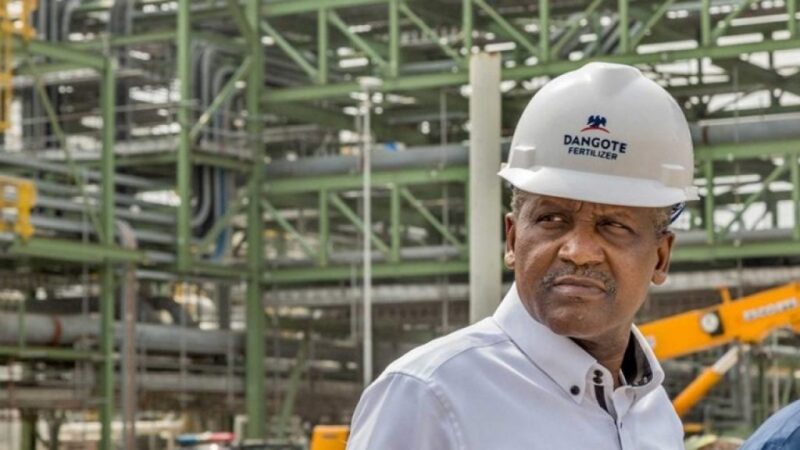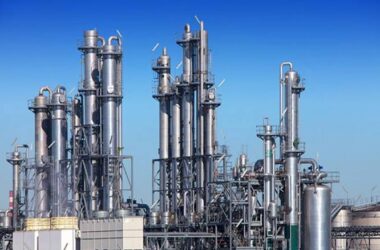Dangote Petroleum Refinery and Petrochemicals has filed a lawsuit against the Nigerian Midstream and Downstream Petroleum Regulatory Authority (NMDPRA) and several major players in the oil import business.
The case, filed in the Federal High Court in Abuja under suit number FHC/ABJ/CS/1324/2024, focuses on the importation of refined petroleum products and seeks to challenge the licensing practices of the regulatory body.
Dangote Refinery is demanding N100bn in damages, arguing that NMDPRA continues to issue import licenses for products like Automotive Gas Oil (AGO) and Jet-A1 (aviation fuel), even though the refinery claims it can produce enough of these products to meet domestic demand.
This, the company asserts, has made fuel imports unnecessary and has disrupted its operations, leading to unsold products and financial losses.
In the affidavit submitted to the court, Ahmed Hashem, Dangote Refinery’s General Manager, Government and Strategic Relations, outlined the company’s concerns about how the ongoing importation of these refined products is undermining the refinery’s business.
He stated, “the plaintiff is distressed greatly, and its business activities and investments are being jeopardized and may get worse by the day unless the Honourable Court intervenes.”
Dangote Refinery further argued that NMDPRA had violated sections of the Petroleum Industry Act (PIA) by issuing these licenses, which are meant to be granted only when there is a proven shortfall in local production.
According to Dangote, the NMDPRA is failing in its statutory role of encouraging local refining by allowing imported products to flood the market, a move that allegedly sabotages the refinery’s operations.
The lawsuit claims that these actions have severely hampered Dangote’s ability to compete in a market where it should have the advantage of being a major local producer.
The plaintiff also pointed out that the issuance of import licenses violates the PIA. The refinery insisted that there was no evidence of a fuel shortfall to justify continued imports and argued that NMDPRA had overstepped its regulatory bounds.
The affidavit also mentioned that the regulatory body has threatened to impose additional levies on Dangote Refinery, including a 0.5 per cent charge on wholesale buyers and another 0.5 per cent levy for the Midstream and Downstream Gas Infrastructure Fund.
According to the refinery, these levies contradict the principles of Nigeria’s free zones, which are designed to promote competition and attract foreign investment.
Additionally, Dangote has accused the NMDPRA and several international oil companies of conspiring to undermine Nigeria’s local refining efforts. The company stated, “these companies and entities are doing everything to sabotage the operation of the plaintiff and have been sponsoring the media to come up with all sorts of stories and untrue statements.”
In the lawsuit, Dangote seeks multiple declarations from the court, including one confirming that it is exempt from all federal, state, and local taxes under the Nigerian Export Processing Zone Act, the Companies Income Tax Act, and other relevant laws. It also seeks the cancellation of existing import licenses granted to several firms, including NNPCL, A.A. Rano Limited, and Matrix Petroleum Services Limited. Dangote claims that these imports are damaging its operations by competing directly with the refined products it is already producing.
In a key section of the lawsuit, Dangote Refinery asked the court to declare, “that the 1st Defendant is in violation of Sections 317(8) and (9) of the Petroleum Industry Act by issuing licences for the importation of petroleum products, as such licences are to be issued only in circumstances where there is a petroleum product shortfall.”
The refinery further sought, “a declaration that the 1st Defendant is in violation of its statutory role and responsibility under the PIA towards encouraging local refineries such as the Plaintiff when it issued licences to other companies to import petroleum products into Nigeria where there is no shortfall in local production.”
Among the other reliefs Dangote is requesting is an order for the court to direct the NMDPRA to “seal off all tank farms, storage facilities, warehouses and stations being used by the 2nd – 7th defendants for the purpose of storage of all refined petroleum products being imported into Nigeria.” Dangote is also calling for the withdrawal of all existing import licenses issued to these companies.
At the first hearing of the case, which took place on Monday, Dangote’s legal counsel, George Ibrahim SAN, informed Justice Inyang Ekwo that the parties involved were exploring a possible settlement. As a result, the court agreed to an adjournment, scheduling January 20, 2025, for a report on the settlement or the continuation of the case.
While Dangote Refinery pushes its case forward, the NMDPRA has stated that it is unaware of the lawsuit. When contacted for a response, the agency’s spokesperson, George Ene-Ita, said, “Well, the authority hasn’t been served any summons on this matter.” This statement indicates that the regulatory body may not yet be formally involved in the legal process, despite Dangote’s efforts to challenge its actions in court.
NNPCL, one of the key defendants in the case, also responded to inquiries from reporters. Its spokesperson, Femi Soneye, offered a brief comment via WhatsApp, simply replying with a sticker that read “Eziokwu,” which translates to “Truth” in the Igbo language. This cryptic response suggests that the national oil company may have more to say as the case develops.
Meanwhile, petroleum marketers have voiced their views on the matter. Billy Gillis-Harry, President of the Petroleum Products Retail Outlets Owners Association of Nigeria, acknowledged that the Petroleum Industry Act allows the NMDPRA to issue import licenses to qualified companies.
He stated, “the matter is already in court and so it becomes subjudice to even analyse the case. But on a general note, we have a Petroleum Industry Act of 2021 and NMDPRA is mandated by law to issue import licenses to qualified companies.”
Another key figure, Chinedu Ukadike, National Publicity Secretary of the Independent Petroleum Marketers Association of Nigeria, expressed that he was not aware of Dangote suing any marketers. He remarked, “I am not aware whether Dangote sued some marketers for importing petroleum products. This is a liberalised marketer. The market is now free. Marketers who might source can do so if their landing cost is cheaper. Now that the government is no more paying subsidies, we should allow for free trade – willing buyer, willing seller relationship.”
However, some industry insiders suggest that the legal case may be losing momentum. Sources close to Dangote Refinery revealed that the lawsuit has already been overtaken by recent developments. One of the sources, speaking on condition of anonymity, noted, “This is not a new case, events have overtaken it and the company has already stayed action on it. It is nothing to worry about.”
In a statement released on Monday, the Dangote Group’s Chief Branding and Communications Officer, Anthony Chiejina, confirmed that the lawsuit was filed earlier in the year amid initial challenges following the start of production at the refinery. He clarified that the company has now paused further legal action and that discussions are ongoing. According to the statement, “This is an old issue that started in June and culminated in a matter being filed on September 6, 2024.”
Chiejina also explained that the parties involved are now in talks following President Bola Tinubu’s directive on the crude oil and refined products sales in naira initiative. The statement read, “Currently, the parties are in discussion since President Bola Tinubu’s directive on Crude Oil and Refined products sales in the Naira Initiative, which was approved by the Federal Executive Council.”
He further added, “We have agreed to put a halt to the proceedings. It is important to stress that no orders have been made and there are no adverse effects on any party.”










